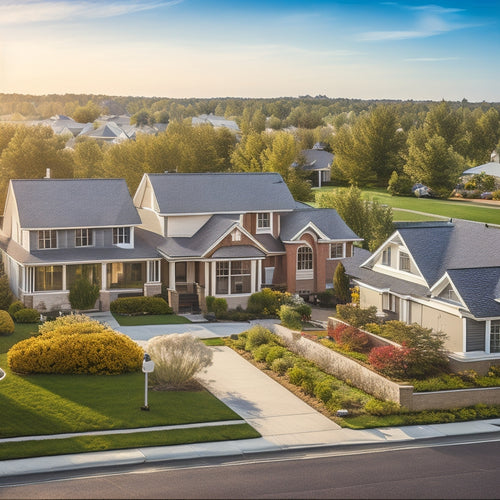
Understanding Solar Panel House Installation Cost
Share
When understanding your solar panel house installation cost, you'll need to assess multiple factors affecting the final bill, which can range from $15,000 to over $30,000. Financing options, tax incentives, system size, and location all play a significant role in determining your expenses. Material and labor costs vary depending on the type and size of your system, with solar panels, inverters, and mounting hardware accounting for a significant portion of the expenses. As you maneuver through these intricacies, you'll want to examine each component that contributes to your overall cost, and by doing so, you'll gain a clearer understanding of how to maximize your investment.
Key Takeaways
- System size and type significantly impact installation cost, with larger systems generating more electricity but incurring higher costs.
- Financing options and tax incentives, such as the Solar Investment Tax Credit, can help reduce upfront costs and make solar energy more accessible.
- Material and labor expenses vary depending on the type and quality of equipment, with solar panels, inverters, and mounting hardware being major cost determinants.
- Roof size, orientation, and condition affect installation cost, with larger roofs requiring more panels and shading issues necessitating additional equipment.
- Permits and inspection fees, including electrical and building permits, inspection fees, and plan review fees, add to the overall installation cost.
Factors Affecting Installation Cost
When it comes to installing solar panels, one of the most critical factors to evaluate is the cost. You need to assess various aspects that affect the overall expense of the project.
To begin with, you'll want to investigate financing options that fit your budget. Many solar panel installation companies offer financing plans, such as loans or power purchase agreements, that can help spread the cost over time. Additionally, you may be eligible for tax incentives, like the Solar Investment Tax Credit (ITC), which can greatly reduce your upfront costs.
The size of your solar panel system is another crucial factor affecting the installation cost. The larger the system, the more expensive it will be. However, a larger system can also generate more electricity, leading to greater long-term savings.
Your location and local building codes can also impact the cost, as some areas may have specific requirements or restrictions that add to the expense. By understanding these factors, you can make an informed decision about your solar panel installation and maximize your return on investment.
Material and Labor Expenses
As you investigate the details of your solar panel installation, material and labor expenses emerge as significant cost components. These expenses can vary depending on the type and quality of equipment, as well as the complexity of the installation.
Here's a breakdown of typical material and labor expenses:
| Component | Material Cost | Labor Cost |
|---|---|---|
| Solar panels | $2.50 - $3.50 per watt | $0.50 - $1.00 per watt |
| Inverters | $0.10 - $0.30 per watt | $0.10 - $0.20 per watt |
| Mounting hardware | $0.05 - $0.15 per watt | $0.05 - $0.10 per watt |
To mitigate these costs, consider assessing financing options, such as loans or power purchase agreements, which can help spread the expense over time. Additionally, you may be eligible for tax incentives, such as the Solar Investment Tax Credit (ITC), which can provide a significant reduction in your upfront costs. By understanding these expenses and assessing available incentives, you can make a more informed decision about your solar panel installation.
Size and Type of System
About 80% of your solar panel installation cost is determined by the size and type of system you choose. This is because the system's size and type directly impact the number of panels, inverters, and other equipment needed, which in turn affect the overall cost.
When selecting a system, you'll want to evaluate factors like system efficiency, which measures how well the system converts sunlight into electricity.
Here are some key considerations to keep in mind:
-
System size: A larger system will generate more electricity, but it will also be more expensive.
-
Inverter type: There are three main inverter types: string inverters, microinverters, and power optimizers. Each has its own strengths and weaknesses, and the right choice will depend on your specific needs.
-
Panel efficiency: More efficient panels will produce more electricity per hour of sunlight, but they may also be more expensive.
- System design: A well-designed system will maximize energy production and minimize costs.
Roof Size and Condition Matters
Your roof's size and condition play a significant role in determining your solar panel installation cost. A larger roof requires more solar panels to generate the same amount of electricity, increasing the overall cost. On the other hand, a smaller roof may require fewer panels, reducing the cost. However, if your roof is too small, it may not be able to accommodate the number of panels needed to meet your energy needs, making it less efficient.
Besides size, your roof's orientation and condition also impact the installation cost. A south-facing roof with little to no shading issues is ideal for solar panels, as it can generate the most electricity. Conversely, a roof with shading issues or an unfavorable orientation may require more panels or specialized equipment, increasing the cost.
Additionally, a roof in poor condition may need repairs or replacement before installation, adding to the overall expense. It's crucial to assess your roof's size, orientation, and condition to get an accurate estimate of your solar panel installation cost.
Permits and Inspection Fees
Before diving into the installation process, you'll need to secure the necessary permits and undergo inspections, which come with associated fees. These fees vary depending on your location, but they're an essential part of making certain your solar panel installation meets local building codes and safety standards.
Here are some key components of the permit requirements and inspection process:
-
Electrical permit: This permit verifies that your solar panel system meets local electrical codes and is installed correctly.
-
Building permit: This permit guarantees your solar panel installation complies with local building codes, such as roof structural integrity and fire safety.
-
Inspection fees: You'll need to pay for inspections to verify that your solar panel system is installed correctly and meets local building codes.
- Plan review fees: These fees cover the cost of reviewing your solar panel installation plans to make certain they meet local building codes and regulations.
Keep in mind that permit requirements and inspection fees can add up quickly, so be sure to factor them into your overall solar panel installation cost.
Frequently Asked Questions
Can I Install Solar Panels on a Metal or Tile Roof?
You can install solar panels on both metal and tile roofs, but consider the metal roof advantages, like ease of installation, and tile roof considerations, such as added structural support and potential waterproofing issues.
Do Solar Panels Increase My Property Tax?
You're wondering if solar panels increase your property tax. The good news is that, in most states, solar panels won't elevate your property tax bill, thanks to solar tax incentives; in fact, they'll likely increase your property value.
Can I Install Solar Panels Myself to Save Money?
"Don't bite off more than you can chew" by attempting a DIY installation; while it may seem like a cost-savings strategy, you'll likely void your warranty, risk safety hazards, and compromise system efficiency, ultimately losing more than you'll gain.
Are Solar Panels Resistant to Extreme Weather Conditions?
You'll be pleased to know that solar panels are designed to withstand extreme weather conditions, boasting impressive weather durability that guarantees they'll keep generating power even in harsh environments with heavy rain, hail, or scorching heat.
Will Solar Panels Void My Roof's Warranty?
"Measure twice, cut once" - prudent advice when considering solar panels. You'll want to guarantee the installation adheres to solar installation guidelines, as improper mounting can indeed void your roof's warranty; understanding roof warranty implications is essential to avoid costly mistakes.
Related Posts
-

Why Go Green With Automotive Products Online?
By switching to eco-friendly automotive products online, you're taking a significant step towards reducing your carbo...
-

Why Certification Matters for Residential Panels
You're looking to understand why certification matters for residential panels. Basically, third-party certification g...
-

Why Invest in Residential Solar Panel Systems?
By investing in a residential solar panel system, you'll harness renewable energy, reducing your carbon footprint and...


